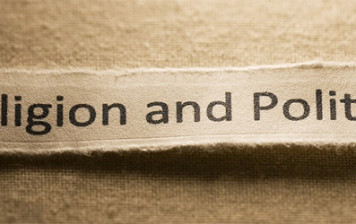
Fabio Vicini*
Fethullah Gülen thinks that in order to spread its beneficial effects, the religious message should reach as many members of society as possible. However, he rejects any political use of Islam. He argues religion cannot be yielded to party needs because it cannot be reduced to an ideological instrument. In his words politics “darkens religion’s spirit, for religion belongs to everyone” (1). This does not mean he is refusing secular forms of governance. In his discourses he upholds democracy, which, in his opinion, is the most fair form of political organization known to men.
He also defends secularism, at least as a political project that should not reject religion but should grant tolerance toward it. In turn he has always awarded a significant historical role to the state in the preservation and defense of Islam (2). He simply argues religions should not care about power but about human aspects of life.
From this perspective the fact that Gülen does not consider the veil or the beard, as essential elements of Islam, is significant. We know that from the mid-1980s onwards, the public use of such outward signs has became an object of dispute between Islamist movements and both the state and secular public opinion in Turkey. Distinguishing himself from other Islamic thinkers Gülen has affirmed he does not consider those signs as indispensable to the accomplishment of Muslim life (3).
Many secularists in Turkey argue that hidden underneath the moderate character of Gülen’s ideas are the leader and his followers’ intentions of changing the country into an Iran-like one. On the contrary, I suggest that Gülen’s theories depend on a reconfiguration of the space Islam must have in an individual’s life and on new ideas about how a “good Muslim” should act in society.
According to Gülen, renewal of Islamic tradition must occur in order to adapt it to the needs of the time. This is why he criticizes other approaches to tradition. If they have tried to reinterpret Islam, they have failed in the moment they have not been able to do it accordingly with the requirements of the modern forms of governance and the present condition of moral decline. Instead, Gülen thinks of Islam as the spiritual dimension of life. Consequently, religion has to furnish a guide for individuals independently from socio-political changing conditions.
In his opinion it is no longer important how strictly a person accomplishes traditional Islamic practices or shows signs of Islamic belonging. What matters is that religion helps people to address the problems of contemporary society. This is why, in his thinking, Islam must push people to actively operate in society in order to overcome the general situation of moral dissipation. When he blames both traditional Islamic education and Sufism for having not been able to reform itself or political Islam for using Islam as an ideological instrument, Gülen is claiming that religion should have an active role in society.
Surely volunteers of the movement are pushed by a strong faith in the accomplishment of their daily tasks. However this does not impede their actions to have a very mundane character. What is singular about Gülen’s proposal is that the pattern of action he prescribes is not only based on secular ideas of responsibility and morals. Even the scope of these activities is socially-oriented. That is, they aim at improving the welfare of society in its totality and not, as usual in Islamic tradition, only of the Islamic ummah. What I suggest is that Gülen movement has a very worldly preoccupation, which is to turn this world into a paradise.
From this point of view the movement seems to pay peculiar attention to “secular matters” – where with secular matters here I intend the preoccupation the state has to grant common welfare to its population. These considerations open the possibility for debate over Gülen movement’s potentialities in the development of a more civil society. Yet contributions in this direction are not unique to it. Even in other Middle Eastern countries Islam has became a public arena from which to debate over current issues.
For example, some authors have connected the appearance of new Islamic patterns of action to the definitive affirmation of “public Islam”, a concept they use to indicate the fact that traditional forms of “Islamic reasoning” have acquired a public dimension. According to them virtuous Muslim subjectivity is no longer connected to the question of soul salvation. Instead Islam has become the subject of public debates about how to conduct a virtuous life under the umbrella of a modern state and how to contribute to both common good and fair government (4). New Muslim intellectuals criticize both the reduction of public dimension to an interacting process between single people’s interests and the implicit ban of morality from public space. Instead they suggest how to cultivate and maintain Islamic virtues and how to use them in order to promote positive initiatives for society. Therefore, Islamic public sphere has became the place from which to address new and alternative ideas of civil society and of public virtues both built upon religious legitimizing principles and practices (Salvatore A. 1998, Hirschkind 2001, Eickelman D. E. & Salvatore A. 2002).
However according to both Salvatore (1998) and Hirschkind (2001), Islamic public sphere in Egypt is a space that is parallel to the secular one. Indeed it has its own rules, modes and public. There practices of Islamic reasoning “locates themselves within the temporal frame of Islamic ummah and in relation to the succession of events that characterize its mode of historicity”. They do not take place within, or serve to uphold, that domain of associational life usually called civil society. In its present form these practices do not play a mediatory role between state and society (Hirschkind 2001:17).
In the Egyptian context Islamic reasoning concerns how to conduct a virtuous Muslim life and how to obtain common good for the Muslim community. Here believers are mostly charged with the duty of overseeing if their own actions and feelings are in line with the requirements of the Islamic authoritative discourses. Even if these discourses become subjects of dispute, the temporal frame and the terms of the discourse remains that of the Islamic ummah. Instead for Gülen, religious conduct consists of acting in this world in order to change it. Gülen’s pattern of virtuous Muslim life is concerned with how to spend a life in order to improve the welfare of all society both in Turkey and in the world.
Secondly, Gülen’s view of the subject understands a radically different conceptualization of the Islamic duty. Individuals must feel themselves responsible for the problems of the world. They are charged with the burden of the problems of society. According to the ethics they have embodied they feel the necessity to strive in action. Here Islam assumes the form of ethics and fulfills the role of inner moral guidance for individuals over how to construct a fair and just society. Usually Muslim Intellectuals charge the components of the Muslim community with the responsibility to preserve Islamic practices against the process of corruption of society (see Utvik 2003). Yet they do not suggest a general program of reform for all society. Neither do they push individuals to act according to a pattern of endless activism in order to realize such a project.
It is the mix composed of this “essentialized” idea of Islam and the search for the common good for all society that makes Gülen’s proposal very peculiar. Even here I argue that this couple renders this mix similar to the secular concept of “civic virtues”. The connection Gülen places between action and transforming this world into paradise indeed have similarities with the duties of citizenship in modern states.
Even if secularism has located human agency in rational mind, it has left some space for morals into so-called “civic virtues”. According to historian Gordon S. Wood, in the eighteenth century, republics distinguished themselves from monarchies for the fact that therein the law had to be obeyed for the sake of conscience, rather than for fear of the ruler’s wrath. People was persuaded to submit their own interest to the government operating for the collective common good. It was this voluntary submission that constituted the eighteenth century notion of civic virtue (5). In this perspective citizens of modern states were not only requested to limit their freedom in accordance with the needs of public interest, but even to contribute to the common good by exercising their civil rights. From this point of view voting and discussing political issues was a right that depended on a specific duty of citizenship. Therefore according to classical definition of secular morality, in some cases individuals should renounce their egoistic interests in order to pursue a higher public interest. The modern concept of civil society stands on this basis.
From this perspective it seems to me that Gülen community’s project in some points overlaps the secular one directed at shaping good and responsible citizens. The moment that Islam pushes people to act in society in order to create a better future for everyone, Gülen’s project of education would seem to be effective in instilling citizens with commitment toward society.
From this point of view I argue that Gülen community is not simply contributing to the construction of an Islamic informed public. Instead, I think its aim is to propose an alternative model to the secular project on how to build a modern, democratic and fair society. Postnational states seem to have lost their force in proposing an adequate and coherent project of civil discipline for their citizens. Gülen has seen the consequences of this weakening in the dominance of materialistic and hedonistic inclinations in modern society. This is why he claims for the need to educate society to Islamic ethical values and secular sciences.
Source: Excerpted from “Gülen’s Rethinking of Islamic Pattern and Its Socio-Political Effects” by Fabio Vicini. This paper was presented at the conference titled “Muslim world in transition: Contributions of the Gulen Movement”, 25-27 October 2007, London
Click here to visit the conference web page.
* Fabio Vicini (MA in anthropology, University of Milano-Bicocca, Milan, 2006 on the Gülen movement; BA in social sciences, University of Modena e Reggio Emilia, Modena, 2003): On the editorial board of ACHAB, Rivista Italiana di Antropologia. Research interests: anthropology of Islam, with a focus on human agency, ethics and emotions; and, secondarily, anthropology of secularism in Ottoman and Turkish history.
Notes:
1- Ünal & Williams 2000:168, taken from Riza Zeylut, Aksam, April 19th 1997.
2- In particular Gülen thinks at Ottoman period as an example of tolerance and coexistence of different believes under the same state.
3- “I see the robe, turban, beard, and loose trousers as details. Muslims shouldn’t be drowning in detail. […] Choosing not to wear [them] shouldn’t be constructed as weakening the Muslim Turkish identity. […] no one should be categorized as a sinner because of such things.” (Ünal & Williams 2000:62-3, taken from Akman, “Fethullah Hoca Anlatiyor”) Therefore responding to a question about the veil the he says: “This issue is not as important as the essentials of faith and the pillars of Islam. It’s a matter of secondary importance in fiqh.” (Ünal & Williams 2000:63, taken from Özkök, “Hoca Efendi Anlatiyor”)
4- As Salvatore argues Islamic jurisdiction (fiqh) has always been interested in a wide set of social issues and has always aimed at the community’s prosperity. However, a general discourse in favour of the “common good” and the collective welfare in relation to modern state’s institutions has consolidated only with the collapse of the Ottoman Empire (Salvatore A. 1998).
5- See Wood, Gordon S., 1969, The Creation of the American Republic, 1776-1787, University of North Carolina Press.
Tags: Civil Islam | Democracy | Hizmet and Politics | Political Islam |Related Articles

Sufism and its origins (by Fethullah Gulen)
Sufism requires the strict observance of all religious obligations, an austere lifestyle, and the renunciation of carnal desires. Through this method of spiritual self-discipline, the individual’s heart is…

Did the Gülen Movement Infiltrate the State?
The Gülen group did not infiltrate the bureaucracy but participated in it. If there is to be a “responsible” party, then it is the AKP government that made…

Fethullah Gülen’s view on mixing politics and religion
Politicizing religion is always a reductionist endeavor: it turns the mysterious relationship between humanity and the Divine into an ideology. Gülen says, “Religion is the relationship between people…
